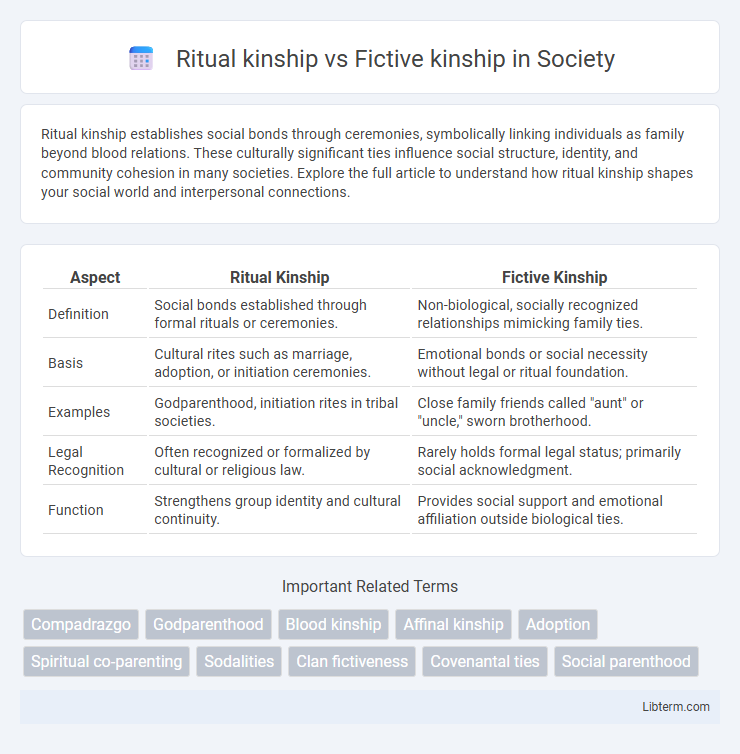Ritual kinship establishes social bonds through ceremonies, symbolically linking individuals as family beyond blood relations. These culturally significant ties influence social structure, identity, and community cohesion in many societies. Explore the full article to understand how ritual kinship shapes your social world and interpersonal connections.
Table of Comparison
| Aspect | Ritual Kinship | Fictive Kinship |
|---|---|---|
| Definition | Social bonds established through formal rituals or ceremonies. | Non-biological, socially recognized relationships mimicking family ties. |
| Basis | Cultural rites such as marriage, adoption, or initiation ceremonies. | Emotional bonds or social necessity without legal or ritual foundation. |
| Examples | Godparenthood, initiation rites in tribal societies. | Close family friends called "aunt" or "uncle," sworn brotherhood. |
| Legal Recognition | Often recognized or formalized by cultural or religious law. | Rarely holds formal legal status; primarily social acknowledgment. |
| Function | Strengthens group identity and cultural continuity. | Provides social support and emotional affiliation outside biological ties. |
Understanding Ritual Kinship: Definition and Origins
Ritual kinship refers to social bonds established through ceremonial acts such as adoption, godparenthood, or religious rites rather than biological relationships. Originating from traditional societies, these ties function to create alliances, mutual responsibilities, and social cohesion within communities. Unlike fictive kinship, which encompasses broad, symbolic relationships formed through friendship or communal ties, ritual kinship is specifically rooted in formal rituals that confer recognized social status and obligations.
Fictive Kinship: Concept and Cultural Significance
Fictive kinship refers to social bonds that resemble family relationships but are not based on blood or marriage ties, often formed through rituals, shared experiences, or mutual support systems. This concept plays a crucial role in various cultures by providing social cohesion, expanding support networks, and reinforcing group identity beyond traditional kin structures. Fictive kinship strengthens community resilience and social capital, especially in contexts where biological kinship is limited or disrupted.
Historical Contexts of Ritual vs Fictive Kinship
Ritual kinship has deep historical roots in societies where formal ceremonies such as marriage, adoption, or initiation rites established recognized social bonds that mirrored biological relationships, often reinforcing political alliances and social hierarchies. Fictive kinship historically emerged in diverse cultures to create social cohesion and mutual support networks beyond blood ties, frequently observed in enslaved communities, diasporas, and indigenous groups adapting to displacement or social disruption. These forms of kinship reflect adaptive social strategies shaped by historical contexts, influencing community structure, identity formation, and resource distribution across generations.
Key Differences Between Ritual and Fictive Kinship
Ritual kinship involves relationships established through ceremonial practices or religious rites, such as godparenthood or initiation ceremonies, emphasizing formal social roles and obligations. Fictive kinship refers to bonds created by choice or social agreement without biological or legal ties, like close family friends or adopted tribal members, focusing on emotional and supportive connections. The key difference lies in ritual kinship's basis in established cultural or religious ceremonies versus fictive kinship's foundation on voluntary, socially constructed affiliations.
Functions and Roles in Social Structure
Ritual kinship establishes bonds through formal ceremonies and shared religious or cultural rites, reinforcing group identity and social cohesion within communities. Fictive kinship creates social ties based on chosen relationships or mutual obligations, often filling gaps where biological kinship is lacking, thus providing support networks and social stability. Both forms function to maintain social order, distribute resources, and regulate behavior by defining roles that transcend genealogical connections.
Ritual Kinship in World Religions and Traditions
Ritual kinship in world religions and traditions establishes social bonds through ceremonial acts, such as godparenthood in Christianity or spiritual adoption in African traditional religions, creating familial ties beyond biological connections. These ritualized relationships often confer moral responsibilities, mutual support, and inclusion in religious communities, reinforcing social cohesion and shared identity. Unlike fictive kinship, which is based on social agreement without formal ceremony, ritual kinship is marked by codified rites that symbolize and legitimize spiritual kin bonds.
Modern Examples of Fictive Kinship Relationships
Modern examples of fictive kinship relationships include godparents, close family friends considered "aunts" or "uncles," and chosen families within LGBTQ+ communities, where individuals create supportive networks independent of biological ties. Ritual kinship, by contrast, is established through formal ceremonies such as marriage or adoption, legally or religiously recognized to create kinship bonds. Fictive kinship emphasizes social and emotional connections, shaping community and identity beyond traditional lineage.
Social Cohesion and Identity Formation
Ritual kinship strengthens social cohesion by formally integrating individuals into established cultural or religious groups through ceremonies, reinforcing shared identity and collective values. Fictive kinship extends social bonds beyond biological ties, fostering inclusive networks that support identity formation and mutual obligation within communities. Both forms cultivate a sense of belonging and solidarity, crucial for maintaining group stability and cultural continuity.
Impacts on Community and Support Networks
Ritual kinship strengthens community cohesion by formalizing social bonds through ceremonies like godparenthood, promoting mutual support and shared identity. Fictive kinship extends support networks beyond biological ties by recognizing chosen relationships, enhancing resource exchange and emotional backing within diverse communities. Both forms of kinship contribute significantly to resilience by expanding social capital and fostering inclusive support systems.
Evolving Perspectives: Future of Kinship Structures
Ritual kinship and fictive kinship both represent alternative kinship structures that challenge traditional biological family models, evolving through social and cultural dynamics. Emerging perspectives highlight how digital communities and global migration increasingly blur boundaries between these forms, fostering inclusive definitions of family based on chosen ties rather than genetics. Future kinship structures will likely integrate ritual and fictive elements to accommodate diverse identities and social networks in a rapidly shifting cultural landscape.
Ritual kinship Infographic

 libterm.com
libterm.com